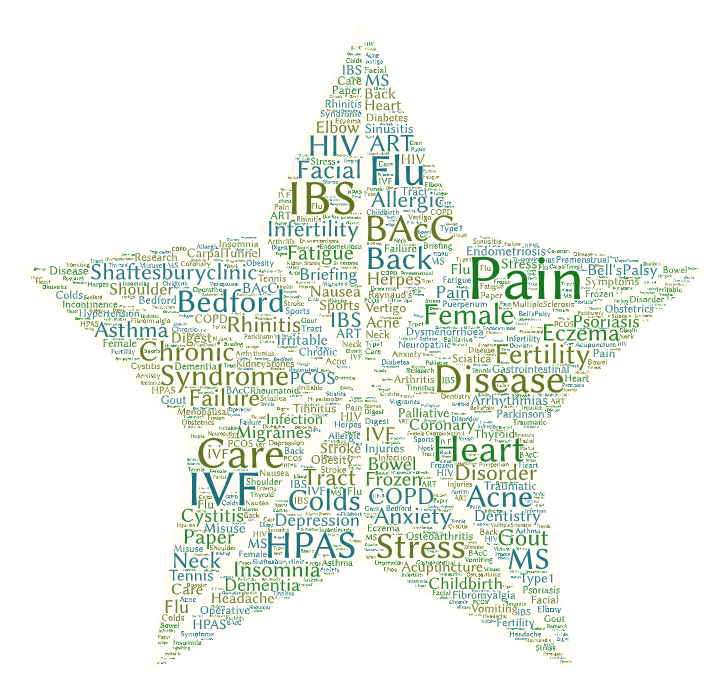Important to know: Chronic health conditions should be addressed under direct medical supervision of your GP or consultant, and acupuncture would be an adjunct or complement to usual care – we advise that you let you doctor know when you use this approach.
About the research: It is worth noting that in research, randomised controlled studies (RCT) are the most reliable in terms of quality of evidence, with a systematic review or meta analysis of numerous studies being the best way of seeing the overall picture of the state of the evidence. Below we have a selection of the available research, which does include some larger RCTs, and reviews of the literature alongside smaller studies. The n= figure tells you how many people were participants in the study.
The British Acupuncture Council factsheet explores a number of research trials and concludes acupuncture could be considered as an option in this condition, in that most trials have found it to be effective (see link below).
A randomised controlled trial (n=224) found acupuncture intervention superior to waiting list control for insomnia, and the effect continued over 13 weeks, and the treatment was safe with a very low side effect profile (Chung et al, 2018). Another RCT (n=72) using sleep monitors as well as patient questionnaires found varying degrees of sleep improvement and a significant improvement in the Insomnia Severity Index (Yin et al, 2017).
A recent systematic review (Shergis et al, 2016), looked at 30 studies (n=2363 in total), some trials used a medicine for the control group, whereas others used a sham or placebo in comparison to acupuncture. Acupuncture was found superior in both cases, although many of the studies had some risk of bias, meaning that further better designed studies would be needed to corroborate these trends.
There is also promising research for acupuncture in insomnia where this is linked to another condition such as depression and sleep quality (Dong et al, 2017 – systematic review and meta-analysis for depression-related insomnia); or stroke (Lee et al, 2016 – systematic review and meta-analysis of 13 RCTs for insomnia after stroke).
Mechanisms of action:
Acupuncture is believed to stimulate the nervous system and has been shown to affect the levels of neurotransmitters in the body. Studies have shown effects which may be linked to a an influence on sleep, in particular acupuncture can increase the levels of a number of neurotransmitters and their modulators including a significant increase in melatonin secretion at night-time (Spence et al, 2004; n=18 with a related decrease in anxiety scores).
Acupuncture has also been shown to influence levels of serotonin, noradrenaline, dopamine, GABA and endorphins in mechanism of action studies (e.g. Samuels et al, 2008 – literature review; Zhou et al, 2008 in an animal model); and to increase nitric oxide activity in the brain in an animal model (Gao et al, 2007, n=48 mice). Acupuncture has been shown in mechanism of action studies to downregulate pain and stress reactions in the brain and nervous system and calm the sympathetic nervous system.
Resources:
British Acupuncture Council evidence based factsheet about Insomnia including specific research, trials and mechanisms of action for acupuncture in this condition.
British Acupuncture Council Research Digest – Insomnia section (near to bottom of document)
References:
Chung, K.F., Yeung, W.F., Yu, B.Y.M., Leung, F.C.Y., Zhang, S.P., Zhang, Z.J., Ng, R.M.K. and Yiu, G.C., 2018. Acupuncture with or without combined auricular acupuncture for insomnia: a randomised, waitlist-controlled trial. Acupuncture in Medicine, 36(1), pp.2-13.
Dong, B., Chen, Z., Yin, X., Li, D., Ma, J., Yin, P., Cao, Y., Lao, L. and Xu, S., 2017. The efficacy of acupuncture for treating depression-related insomnia compared with a control group: a systematic review and meta-analysis. BioMed research international, 2017.
Gao, X.Y., Ma, Q.L. and Hu, B., 2007. Effects of acupuncture at” Sishencong”(EX-HN 1) on physiological functions in the sleep disorder model mouse. Zhongguo zhen jiu= Chinese acupuncture & moxibustion, 27(9), pp.681-683.
Samuels, N., Gropp, C., Singer, S.R. and Oberbaum, M., 2008. Acupuncture for psychiatric illness: a literature review. Behavioral Medicine, 34(2), pp.55-64.
Shergis, J.L., Ni, X., Jackson, M.L., Zhang, A.L., Guo, X., Li, Y., Lu, C. and Xue, C.C., 2016. A systematic review of acupuncture for sleep quality in people with insomnia. Complementary therapies in medicine, 26, pp.11-20.
Spence, D.W., Kayumov, L., Chen, A., Lowe, A., Jain, U., Katzman, M.A., Shen, J., Perelman, B. and Shapiro, C.M., 2004. Acupuncture increases nocturnal melatonin secretion and reduces insomnia and anxiety: a preliminary report. The Journal of neuropsychiatry and clinical neurosciences, 16(1), pp.19-28.
Yin, X., Gou, M., Xu, J., Dong, B., Yin, P., Masquelin, F., Wu, J., Lao, L. and Xu, S., 2017. Efficacy and safety of acupuncture treatment on primary insomnia: a randomized controlled trial. Sleep medicine, 37, pp.193-200.
Zhou Q et al. The effect of electro-acupuncture on the imbalance between monoamine neurotransmitters and GABA in the CNS of rats with chronic emotional stress-induced anxiety. Int J Clin Acupunct 2008 ;17: 79-84

